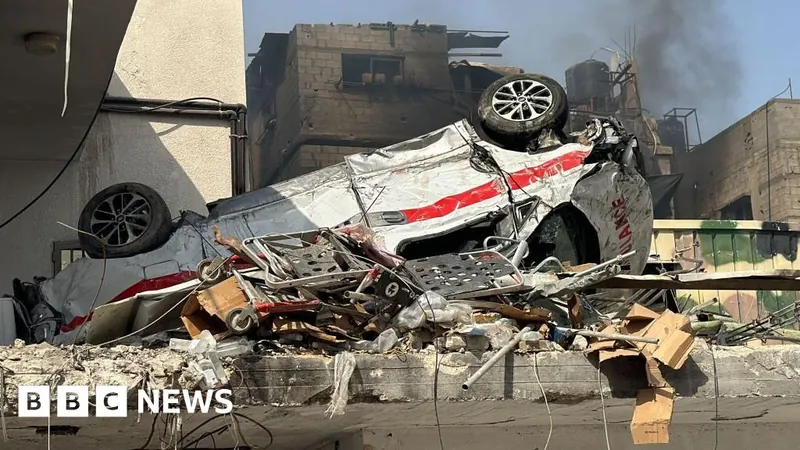
UN Warns of Impending Healthcare Catastrophe in Gaza Amidst Israeli Strikes
2024-12-31
Author: Lok
UN Warns of Impending Healthcare Catastrophe in Gaza Amidst Israeli Strikes
In a shocking revelation, the United Nations Human Rights Office has announced that relentless Israeli military operations targeting hospitals in Gaza have pushed the region's healthcare system to the verge of collapse, raising grave concerns over potential war crimes and crimes against humanity.
A recent report highlights a troubling trend where Israeli forces have not only shelled hospitals but also imposed sieges and forced evacuations, leading to unnecessary loss of life among patients and medical staff. While Israel has accused hospitals of being utilized by Palestinian armed factions, the evidence put forth remains largely vague and unsubstantiated, according to the UN.
UN Human Rights High Commissioner Volker Türk condemned the situation, stating, "As if the relentless bombing and the dire humanitarian situation in Gaza were not enough, the one sanctuary where Palestinians should have felt safe became a death trap. The protection of hospitals during warfare is paramount and must be respected by all parties involved."
The report identifies at least 136 attacks on 27 of the 38 hospitals in Gaza, along with strikes on 12 other medical facilities from October 2023 to June 2024. These hostilities have resulted in significant casualties among healthcare professionals and caused extensive damage to crucial medical infrastructure.
Under international humanitarian law, hospitals and medical staff are afforded specific protections, provided they are not being used to conduct military operations. Any attacks must adhere to strict guidelines of proportionality and precaution. The UN report categorically labels as war crimes any deliberate attacks against healthcare facilities or the civilian populace, emphasizing the deliberate destruction of medical infrastructure as a form of collective punishment.
Israel has justified its assaults by claiming that hospitals were being misused by militants. However, the UN’s findings have questioned the validity of these assertions, indicating that the evidence is insufficient and often contradicts what is publicly available. "If verified, these accusations could imply that armed groups are intentionally using civilian presence to shield themselves, constituting another war crime," the report indicates.
The health impacts of these military operations stretch far beyond structural damage. Many women are forced to give birth under dire conditions, often lacking enough pre- and postnatal care, thereby dramatically increasing the risk of maternal and infant mortality. Reports have also surfaced indicating that several newborns have lost their lives due to their mothers being unable to secure necessary medical attention.
Moreover, the Gaza health ministry has reported an alarming 80% reduction in available hospital beds, alongside the tragic deaths of over 500 medical personnel by the end of June. Patients with traumatic injuries face crippling delays in receiving critical care, with many succumbing to their conditions while waiting for treatment or being prematurely discharged in overcrowded facilities.
In response, the Israeli government claims to have implemented various measures aimed at mitigating harm to civilians and supporting the medical system. They assert that the military has facilitated evacuation routes, supplied medical aid, and even set up field hospitals. However, they also accuse Hamas of exploiting these medical facilities for military gain, further complicating the narrative.
Amidst these escalating tensions, Türk has called for independent investigations into the documented incidents, emphasizing that it is imperative for Israel, as the occupying power, to ensure unimpeded access to essential healthcare services for the Palestinian population.
As the world watches this unfolding crisis, the urgent question remains: how much longer will the people of Gaza endure this humanitarian catastrophe? The stakes could not be higher.


 Brasil (PT)
Brasil (PT)
 Canada (EN)
Canada (EN)
 Chile (ES)
Chile (ES)
 Česko (CS)
Česko (CS)
 대한민국 (KO)
대한민국 (KO)
 España (ES)
España (ES)
 France (FR)
France (FR)
 Hong Kong (EN)
Hong Kong (EN)
 Italia (IT)
Italia (IT)
 日本 (JA)
日本 (JA)
 Magyarország (HU)
Magyarország (HU)
 Norge (NO)
Norge (NO)
 Polska (PL)
Polska (PL)
 Schweiz (DE)
Schweiz (DE)
 Singapore (EN)
Singapore (EN)
 Sverige (SV)
Sverige (SV)
 Suomi (FI)
Suomi (FI)
 Türkiye (TR)
Türkiye (TR)
 الإمارات العربية المتحدة (AR)
الإمارات العربية المتحدة (AR)